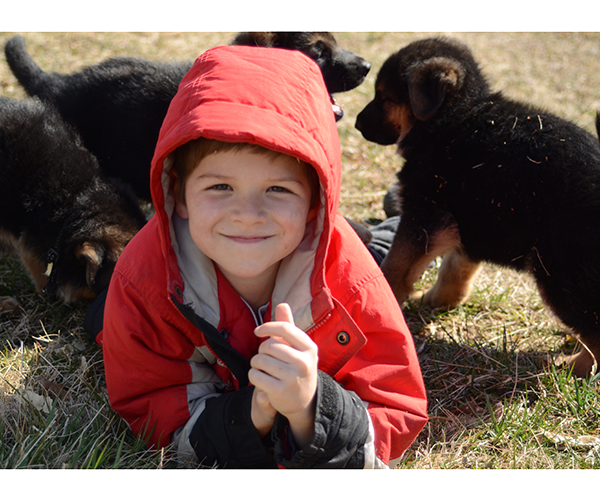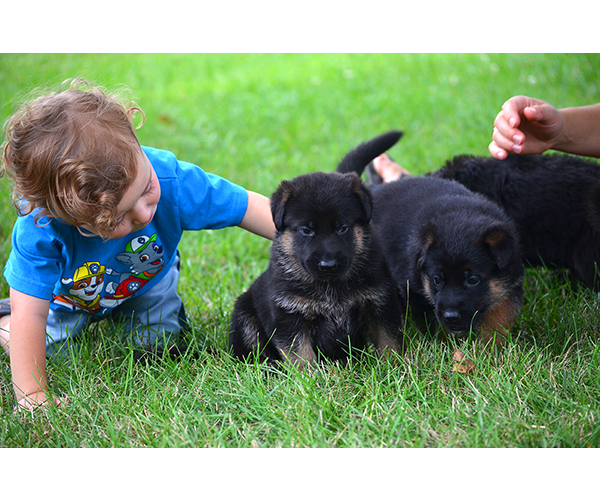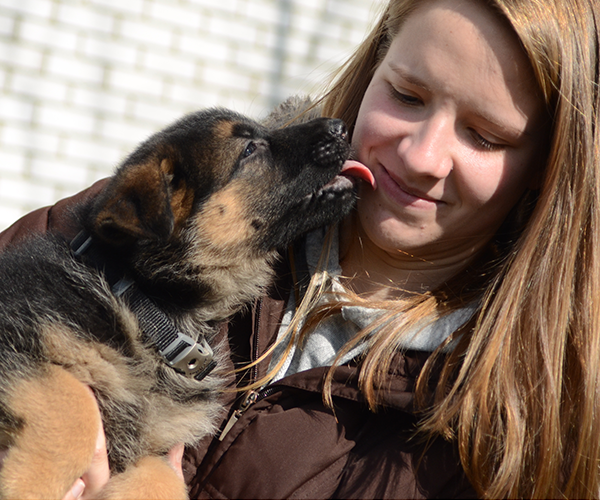Your Puppy’s Life with us at Euro Deja
The first 8 weeks lay the groundwork for the rest of your puppy's life in regard to Health and Temperament.
Everything we do is carefully planned, designed, and intentionally carried out with this in mind. We are constantly researching and seeking to further improve our program.
Health
For large breeds like German Shepherds, a major health concern is hip dysplasia. Puppies are born with perfect hips; their joints are cartilage at birth and only become bone as the puppy grows. Research shows that environment during the first 8 weeks has great impact on joint development. The three most important environmental factors are nutrition, exercise, and surface area.
Nutrition: this starts before the pups are even born! Our Mama dogs are on the highest quality food, and are given equal quality prenatal vitamins during pregnancy. After the birth of their pups, they're given post-natal vitamins for recovery and nursing. Once our puppies are transitioned to solid food, they are also only given the highest quality nutrition. Their weights are carefully monitored in order to prevent obesity; overweight puppies have a much higher risk for developing dysplasia.
Exercise & Surface Area: studies show that puppies raised on hard surfaces have a higher risk of dysplasia, while those that regularly play on soft, uneven surfaces (i.e. the yard) are at lower risk. We have carefully chosen the surfaces on which our puppies live for optimal health and cleanliness. While they are very young and not able to walk, they are on a carpet-like material designed specifically for puppies that we wash regularly to keep our puppy nursery fresh. It is not only comfortable for Mom and pups, but also provides good traction to strengthen muscles that hold joints in place. When the pups are older, we are also very intentional about taking them outside several times each day for safe and fun “play time” on the naturally beneficial soft ground. This is healthy for body and mind; a constantly cooped-up puppy is an unhappy and understimulated puppy. For more information on research about the environment affecting hip and elbow development, click HERE.
Temperament
The number 1 reason for puppies and dogs being abandoned or placed in a shelter is temperament. A bad temperament can be the result of irresponsible and/or uneducated breeders turning out puppies with unsound, nervous, or aggressive temperaments. It can also be the result of poor socialization during the most crucial first 8 weeks of life. In addition to breeding only well-mannered dogs that produce sound temperaments according to standard, we have a reputation for producing puppies socialized well above normal expectations and for putting a significant amount of intentional work to condition each puppy for family life. Our pups greatly benefit from our foster program setup and the fact that we are a family professionally breeding on the small scale. Read more about this on our Home Page. Our pups are not only used to group interaction, but are also regularly given individual one-on-one time. They are exposed to many positive and safe situations/sights/sounds and interact with all ages. Each day from birth is filled with intentional handling and conditioning for a solid foundation in life and smooth transitions to their new homes. The section "From Day 1 to 8 Weeks" below lists some of the ways we do this.
Families Raising Pups for Families



From Day 1 to 8 Weeks
From birth until ~4 weeks the puppies are on soft, carpet-like material; it provides good traction to help prevent future joint problems and promotes warmth and comfort. When the puppies start eating solid foods and require more room to run and play, they are moved to a larger playpen more suited to their rapidly growing bodies and minds. It is important for the mother to be allowed to nurse the puppies for as long as she will tolerate it. She provides excellent nutrition with immune and digestive support. We start intentionally spot-training the pups to pave the way for smooth house training. This has yielded excellent results. Every pup is different, but most new families have reported only a few messes in the house, and usually only due to a mistake in watchfulness. Others have reported no messes.
We post videos and photos (as time allows) of the puppies as we grow and save them to each litter's individual highlight on instagram. These videos and pictures are great keepsakes for the future.
By 4 weeks old, crates (at first with no door attached) are now being left in their puppy area and incorporated into their outside play times. They'll happily choose to walk into the crate and relax inside for short periods of time, or to play inside. There's still ground to cover from this point, but the right start. If you’ve ever tried to put a new 8 week old pup in a crate, sheer panic ensues and it's apparent why it would be helpful for the breeder to have introduced it earlier. The pup has clearly never been alone in its lifetime, having always been surrounded by Mom and/or littermates. Add being confined in a strange crate in a new home, and it can be quite the sleepless uphill battle for weeks, even when introduced slowly and positively. Crates keep young pups safe, and should be taught young by the breeder as a happy place to be. It is quite the undertaking to set the crate training foundation for an entire litter at once, but we have found it extremely valuable to our puppies and their new families.
At 5 weeks old, doors are added to the puppies' individual crates, and extremely short crate training sessions begin. These sessions are increased over time as training progresses and according to how long age allows the puppies to comfortably nap and hold their small bladders.
During the 6th week, the puppies get their first vet visit and car ride. Each one is thoroughly examined and they receive their first vaccinations. We make this a positive experience for the pups and they enjoy exploring the vet's examination room.
At 49 days old (7 weeks), each of the puppies will be temperament tested with the Volhard Puppy Aptitude test for the sake of even better home placements. Temperament isn't fully developed until long after the pups leave our care, but this testing can help predict several aspects of a pup's future temperament. We’ve always had highly satisfactory placements, but are always looking to improve and can even better ensure each family gets the best match to their preferences, lifestyle, experience level, or needs within the normal range of pups we produce. But the most important reason we now do temperament testing is because we've placed quite a few pups with families as service or therapy dogs, and continue to get requests for this for a variety of special needs. We've had quite the range: from a service dog trained to be the ears for their Deaf family, to therapy dogs trained for autistic children, and more. Each scenario requires slightly varying temperaments to be best suited. The aptitude test will help best match clients with specific special needs to the right pup.
After the aptitude test at 7 weeks old, we’ll have our clients choose their puppies in the order in which the deposits were placed. They may choose remotely through pictures and our feedback on coat, temperament, etc. Or families may choose in person; whichever they prefer!
At 7.5 weeks of age, each puppy is microchipped with an AKC Reunite 134.2 kHz ISO chip. Each family can enroll online after taking their pup home; there's a one affordable payment for lifetime registration. We time microchipping to be a few days before the pups go to their new homes so that no special care is required of their new homes for the insertion site. The main trick is that they should not be pet between their shoulder blades or the chip is known to be worked out. By 8 weeks old, working out the microchip is no longer a concern and we double check each puppy with a scanner to ensure successful implantation. The combination of microchipping and wearing ID tags will help ensure the identification and safe return of your beloved companion should unexpected separation ever occur.
Crate training sessions have continued, and throughout their time with us they've gotten regular "Socialization walks" - this acommodates their physical needs as well as daily provides new introductions to new postiive situations/sounds/experiences on our acreage.
Puppy pick-up day is fast approaching, and before the pups go to their new homes they're each given a fresh bath.
At 8 weeks of age, the puppies are ready for their new homes! They are happy, healthy, well-socialized, and confident! When they are picked up, the remaining purchase price is due in cash.
We want both our puppies and our customers to be happy! During the first 8 weeks, the groundwork has been laid for success, but our service doesn't end there. You can count on us now and in the coming years for a lifetime of support.
*Please note that if we are asked to hold a puppy past its eight week old date, an extra $20.00 will be charged each additional day for food and boarding.
Each Puppy Comes With:
- Limited AKC Registration (no breeding rights)
- Vaccine and Deworming Records
- Vet Exam Notes
- Microchipping
- Hip & Elbow Guarantee
- Lifetime Genetic Guarantee
- Additional 10 Day Health Guarantee
- Lifetime of Support
Placing a Deposit
We start accepting deposits when a breeding is planned.
Deposits are non-refundable but can be transferred to another litter.
The deposit must be accompanied by a signed copy of our guarantee and transaction terms which can be found HERE.
Often litters are sold out entirely before the puppies reach 7 weeks of age. However, should a family wish to wait to place a deposit in person, they may do so at 7 weeks when the puppies are old enough for visits. There is no guarantee, however, that any puppies will be available by that time. We do not allow visits prior to the puppies being vaccinated, to protect them from potential introduction of harmful bacteria or viruses.